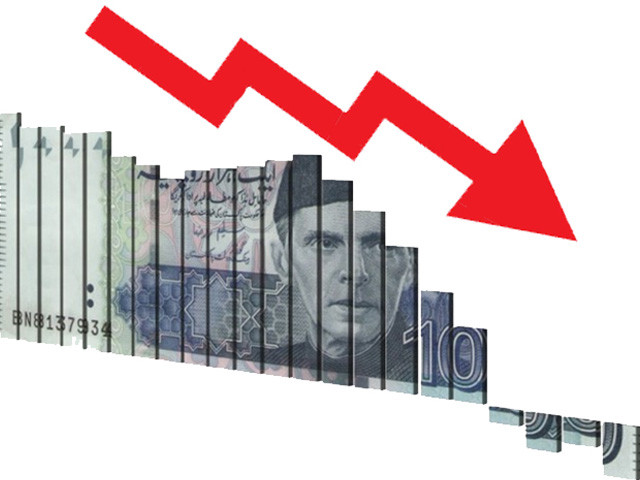KARACHI:
What had to happen has happened. The rupee in the interbank is scrambling to find its true value against the US dollar. Within a few days, the rupee has fallen from Rs232 to Rs262 against the king dollar.
Hopefully, the volatility will be tamed as the economy takes corrective measures to restore confidence. It may, however, take a little longer to unveil the spiralling wave of inflation.
Whatever the case maybe, the damage has already begun and it is time to shield ourselves from it.
From the perspective of policy makers, incentives should be given on every penny in order to convert illegally flowing remittances into official banking channels. Here are ten steps that need to be undertaken to survive this dollar-drive depreciation:
As a first step, strict action is vital against all those exchange companies offering a larger premium against the interbank, especially as now there is no cap on the interbank rate.
Secondly, banks should be given incentives for each dollar of growth they record in the system to market to and attract overseas Pakistanis.
Thirdly, exporters should be keenly observed – proceeds should be brought in on time and any potential energy subsidy should be contingent upon the maximum conversion of dollar proceeds.
As a fourth step, an all-guns-blazing attitude is required to rope in additional exports from the IT sector.
Fifth; there needs to be a further uptick applied in the Naya Pakistan Certificate dollar returns, especially as global markets have increased yields by 4%.
Sixth; exporters should be provided with all raw material required to operate at full capacity – even if that comes at the expense of keeping domestic lights shut.
Seventh; value-adding and import-substituting policies, such as petrochemical, refinery, solar manufacturing, agri-yielding etc should take precedence over any other industries.
Eighth; the current account deficit should be capped at 1% of GDP at all costs for the next few years to channel the country’s energies towards exports growth.
Ninth; our local workforce needs to be trained and exported to new markets with higher wages and skill requirements to cater to the global needs – perhaps the export of nurses is something to consider.
Tenth; strict compliance of the International Monetary Fund’s (IMF) plan is vital to ensure the inflow of dollars from bilateral and multilateral sources and to keep pumping the country’s wafer-thin forex reserves with funds for at least 5-6 month import cover.
The government has had no choice – nor did it have any to begin with – but to stop dithering while executing plans. Instead of blaming the IMF or using it as an excuse, it would be much better use of time for the policy makers to instead evaluate the real structural reforms required – reforms that they have collectively failed to execute for many decades.
At the current moment, there is no tangible progress being made in privatisation, no new railway lines are being introduced, no IT exports, no increase in agricultural yields, we have yet to produce half a million IT graduates, no dropping of weight in the form of state-owned enterprises (SOEs) etc.
The meagre work that the private sector is able to do in the few years of stability gets wiped out due to extreme macro disruptions, rendering feasibilities unviable right after expansions and new set ups.
The only way to be a sovereign, independent and progressive state is to grow exports by 20% every year for 10 years – attention given to this aspect of the economy, however, is a fraction of what is needed.
Create a separate industry, hire foreign experts, give them multimillion dollar bonuses or a tax-free income if that’s what it takes. But if we feel like growing exports is not a priority, then beware of consistent economic crises where prices are updated every day and people demand salaries in US dollar.
Sri Lanka, Turkey and Egypt have strong tourism inflows to keep their economy afloat. We don’t. All Pakistan has is its people – so let’s make the most of that and keep hope alive.
The writer is an independent economic analyst
Published in The Express Tribune, January 30th, 2023.
Like Business on Facebook, follow @TribuneBiz on Twitter to stay informed and join in the conversation.















































